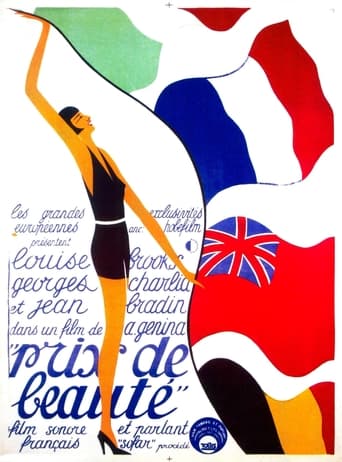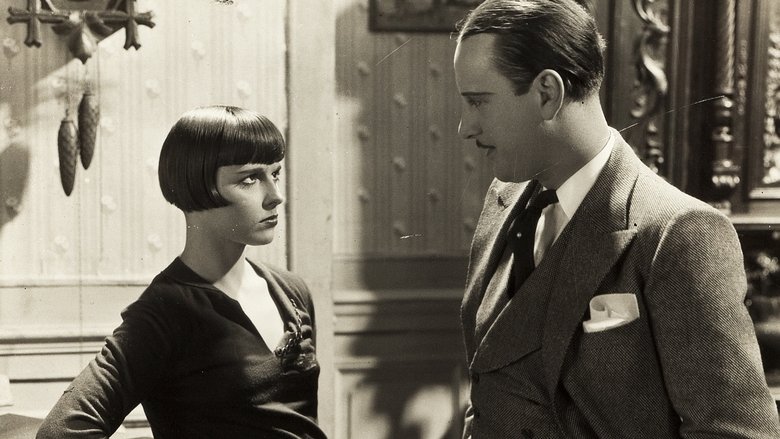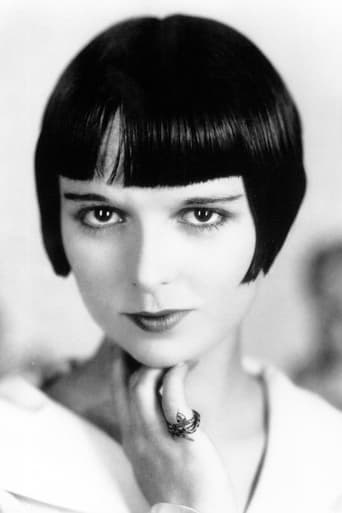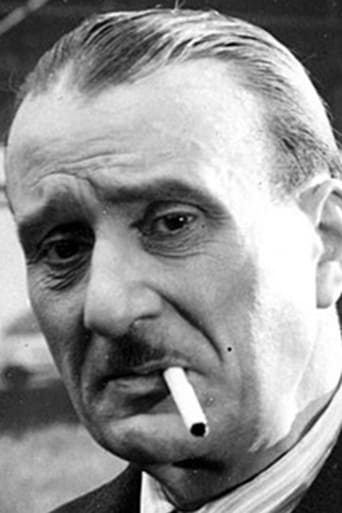

Miss Europe (1930)
Lucienne, typist and gorgeous bathing beauty, decides to enter the 'Miss Europe' pageant sponsored by the French newspaper she works for. She finds her jealous lover Andre violently disapproves of such events and tries to withdraw, but it's too late; she's even then being named Miss France. The night Andre planned to propose to her, she's being whisked off to the Miss Europe finals in Spain, where admirers swarm around her. Win or lose, what will the harvest be?
Watch Trailer
Cast


Reviews
Prix de Beauté is an interesting late Louise Brooks vehicle. Initially much lighter in tone than Pandora's Box or Diary of a Lost Girl, there is a sudden twist in the narrative at the end which changes the way in which one looks at the entire film.Brooks here is at her best, though she is playing a somewhat more sympathetic character than those she portrayed in her two best known films. Amusingly, her character, Lucienne, is referred to as Lulu in the opening minutes of the film, recalling her previous year's success. Although her voice is overdubbed in French, Brooks carries the role convincingly with her masterful use of facial expressions, learned during her years making silents.The opening scenes show her fiancé, Andre, bullying a work colleague yet this is depicted in a slapstick manner, leading one to think the film will be a comedy.Andre is depicted from the outset as a largely unsympathetic character due to his domineering nature but there is a slight nuance to the performance and one feels increasing sympathy as it is shown that Brooks' character is more interested in the glamour of her new career than remaining loyal to him and her fickleness in love allows one to understand the turn events take at the end.One interesting technique used throughout the film is to contrast scenes of the organic (Brooks and the other pageant contestants) with extreme close-ups of the mechanical (such as the printing press, the piano and various clocks.) The scene of the bird trapped in the cage may be a cliché now but it works effectively in this film as a symbol of Lucienne's feelings of being trapped in a drab life by Andre.Sound is not used in a particularly innovative way in this film but the score is delightful and suits the atmosphere of the story. In particular, the early jazz music and bal-musette piece during the ballroom scene are lovely.The film is well paced and tension builds quickly, though not abruptly, as the mood changes towards the end. The lighting becomes almost noir-like and the scenes of Lucienne dying whilst her image lives on, happily, on the screen, are a wonderfully ironic touch.Overall, this film will be of most interest to fans of Brooks and connoisseurs of early French cinema. It falls short of being a masterpiece but it is well-executed and intriguing, making it a solid work that can be enjoyed by all.
BEAUTY PRIZE (Augusto Genina - France 1930).Louise Brooks' last starring role in a feature, and her only film made in France. It's the story of Lucienne, a high-spirited Parisian typist who leads a mundane life with her fiancé, André, and a number of friends. While André indeed loves Lucienne, he has conventional expectations for their future together. When the Miss Europa beauty contest comes to town, he warns her to "not even dream" of entering it. Lucienne ignores his advice, and from there on, she struggles for independence and happiness, but André is overcome with jealous rage...I just watched "Prix de Beauté" in the sound version on the Kino Video DVD-release. The film was shot as a silent and Louise Brooks voice was badly dubbed by a French actress. The post-doctoring of this silent film into a talkie was badly done in the first place, and, on top of it, the transfer to the DVD is pretty shabby as well. Sometimes too light, then too dark, too fast, too slow. It's a mess. A mediocre film that might have worked as a silent but is no comparison to earlier films Louise Brooks made with G. W Pabst, "Pandora's Box" and "Diary of a lost Girl." I watched this for the obvious reason of Louise Brook's last starring role, but it's only worth it for Brooks-aficionados or completists. Watch the silent version or turn of the sound, and make the best of Louise Brooks' intoxicating presence. The five stars are hers.Camera Obscura --- 5/10
Prix de Beauté was made on the cusp of the changeover from silence to sound, which came a little later in Europe than in Hollywood. Originally conceived as a silent, it was released with a dubbed soundtrack in France, with a French actress speaking Louise Brooks' lines, but was released as a silent in Italy and other parts of Europe. I was lucky enough to see the Cineteca di Bologna's flawless new restoration of an Italian silent print at the Tribeca Film Festival. I haven't seen the talkie version yet, but I think it's safe to assume the silent version is much more satisfying, since by all reports the dubbing is poorly done (Louise Brooks is clearly speaking English, so there's no way her lips could be matched.) Also, the film is made entirely in the silent style, with few titles and little need for dialogue. Prix de Beauté tells its story visually, with exciting, imaginative camera-work. The opening is instantly kinetic, with rapidly-cut scenes of urban life and swimmers splashing at a public beach. Throughout the film there is an emphasis on visual detail, on clothing, machinery, decoration, and symbolic images such as a caged bird, a heap of torn photographs, a diamond bracelet. This is silent film technique at its pinnacle.Louise Brooks, of course, is responsible for saving the film from obscurity. Seeing this makes it only more heartbreaking to reflect that this was her last starring role. Lustrously beautiful, she dominates the film with her charisma and also gives a perfectly natural yet highly charged performance. Her role here, more than in the Pabst films for which she's best known, is a woman we can fully understand and sympathize with. She plays Lucienne Garnier, a typist with a possessive fiancé, who yearns to get more out of life and secretly enters a beauty contest, with immediate success. She is then torn between the excitement of her glamorous new life and her love for the man who insists she give it all up or lose him. All of the characters are drawn with nuance. The fiancé inspires pity and is not merely a brute: he loves Lucienne, but is a limited man who can't cope with her having a life apart from him or attracting the attentions of other men. Even the "other man" in the story is not the simple slimeball we first take him for, though his intentions may be just as possessive as the fiancé's.*************************WARNING: SPOILERS BELOW***************** The film has many fine set pieces, including Lucienne's triumph in the "Miss Europe" contest, shown through the comic reactions of assorted audience members, who wind up pelting the heroine with flowers; her misery as a housewife, peeling potatoes while the pendulum of the cuckoo clock marks time behind her; a nightmarish trip to a fun-fair (in the silent version, this occurs late in the film, after her marriage) at which Lucienne, crushed among the low-lifes and depressed by her husband's macho antics, decides that she can't go on with her present existence; and especially the final scene in the projection room where she views her talkie screen test. Louise Brooks may never have looked more beautiful than she does here, with the projector's beam flickering on her alabaster profile, her shoulders swathed in white fur, her face incandescent under the black helmet of hair as she watches herself singing on screen. The double shot of her exquisite corpse and her still-living image on the screen is particularly poignant: Louise Brooks' image, like Lucienne's, remains immortal despite her frustratingly aborted film career.
Please Note: I see from the various posts that there was an original silent version and also a sound version of this same film. I saw the sound version and it was esthetically yicky. Considering some indicate that the original version was LONGER and without crappy dubbing, my review must be read with this in mind.Although I know that Rene Clair has a lovely reputation as a film maker and Louise Brooks has a bit of a cult following as well, this is in many ways a technically poorly made film. While Hollywood had already pretty much switched to sound mode around 1929, up through the early to almost the mid-30s, a lot of famous French films were essentially silent films--with some dialog and sound effects very poorly slapped over top the film. The lip movements in many, and in particular this film, don't even come close to matching what is being said and this would explain why an American like Ms. Brooks could do a French film. This is just sloppy and I would have preferred they had just made a silent film--and as a silent film this is would have been an average film--with excellent camera work (at times) and some decent silent-style acting.The problem I also found with the film was the overly simplistic plot. For a silent morality play circa 1920, it would have been fine, but by 1930 standards the plot is a bit hoary (that means "old"--not "slutty"). A lady wins a beauty contest and her macho fiancé can't handle it. She gives it all up, temporarily, but is lured back to the fancy life and this spells her end! A tad melodramatic, huh? And also a bit simplistic and underdeveloped.Finally, the character of the fiancé's friend(?) I found very disturbing and unreal. He looked like Harold Lloyd and spent much of the movie being abused and picked on by the friend and everyone else. As he just took it throughout the movie and no resolution came about, his character seemed superfluous and the treatment he received mean-spirited. Were audiences supposed to laugh as he was abused? This seems to me that's what is implied and I don't like it at all.There are FAR better French films of the era (Le Million, La Femme du Boulanger, Fanny, Regain, and others) as well as better silent films. I just can't understand this film's high rating.




